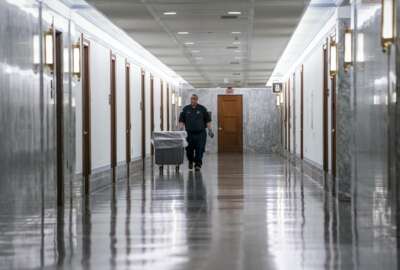
Congress mulling over what should or shouldn’t be reopened
Lawmakers on Capitol Hill head into another week of trying to find a consensus on next steps for reopening, or not, parts of the country.
Best listening experience is on Chrome, Firefox or Safari. Subscribe to Federal Drive’s daily audio interviews on Apple Podcasts or PodcastOne.
The Senate Education and Health Committee will delve into the reopening of schools and places of business even with a mixed outlook on the coronavirus. Also on the Hill this week, Congress will step up the push to get some oversight of all that spending. With more on the outlook, WTOP capitol hill correspondent Mitchell Miller joined Federal Drive with Tom Temin.
Interview transcript:
Tom Temin: And Mitchell we should start with this whole DC statehood thing which I have a feeling is going to blow over like it usually does. But what are they saying as of this morning?
Mitchell Miller: Well, right now, as you might expect, the Republican controlled Senate and Senate Majority Leader Mitch McConnell are saying they are not going to take up the bill that was passed on Friday, a historic vote though in the House. This has been something as you know that DC has been working on for decades. That was the first House vote on the floor since 1993 when it was rejected in that year. And then the house on Friday passed this historic legislation which would give DC two Senators and one House member, and of course therein lies the political rub. Republicans do not want to see this happen. They don’t want DC to have a chance to get possibly three more lawmakers on the Democratic side, which would likely happen since DC of course, is predominantly democratic by party. So we’ll see what happens. But right now the Democrats are really just celebrating the fact that it reached this milestone. It’s been a long road for DC Delegate Eleanor Holmes Norton. She got a lot of support in Congress on the House side from Democrats, of course, Republicans strongly opposing this saying that it’s unconstitutional. What we would see likely down the line would be the following. For the Democrats, their best case scenario would be that they would take control again of the Senate and that they would potentially get control of the White House and they would of course, control both chambers and the White House and eventually try to get it through the Senate and a final passage. However, even if that happened, and that’s a long ways away, of course in a lot of things. gonna happen — even if that were to happen, there’s no doubt that this would go to the US Supreme Court and it would really set up a major legal battle. But a very interesting case here in Washington, DC.
Tom Temin: And down to more mundane business. As we mentioned at the beginning of this, the Senate Health and Education Committee, has a lot of work to do too.
Mitchell Miller: Yeah, this is going to be a busy week and it’s really important now, especially with all of these hotspots across the country. There was a warning on Friday from the White House coronavirus task force which we had not heard from in a long time. And Dr. Anthony Fauci basically told the country that things need to be brought under control, that he set out another warning related to young people reminding them he understands the difficulties of trying to stay in but because of all these places like Florida, Texas, California and South Carolina that a lot of work needs to be done. So that really heightens the importance of this hearing by the Senate Education And Health Committee chaired by Tennessee Senator Lamar Alexander — they are going to hear tomorrow from Dr. Fauci as well as the head of the CDC, Dr. Robert Redfield. It’ll be interesting to hear what they have to say given what they said last week. There are of course huge issues for a lot of people, including federal workers and their families, what is going to actually happen with the return to work? Obviously, it’s been staggered over a period of months. And also, of course, the biggest looming question for many people is what is going to happen with the school systems. The last time Dr. Fauci appeared before this panel, he was very cautious about how people might be returning to schools. There are a lot of people that are advocating that kids get back to schools, they cite studies in other countries that suggests that possibly there may not be as much spread as within younger people. So it’ll be really interesting to see what happens at this hearing tomorrow.
Tom Temin: And the oversight of spending I think people have been expecting already for a long time, because now the stories are starting to trickle out of checks going to deceased people and so on. So what do you see ahead there?
Mitchell Miller: Well, Congress is really trying to step up oversight related to the billions of dollars that have gone out under the CARES Act — I should say hundreds of billions of dollars. The GAO report that you cite of course got a lot of attention last week that said $1.4 billion went out to more than a million people who are deceased, obviously, that got a lot of people’s attention. And that came from a General Accounting Office report that really looked at a lot of other issues as well and it raised a lot of red flags for a lot of lawmakers, many on the Democratic side, particularly, and many Republicans as well, wondering exactly where some of this money is going. There’s also been questions about where the money is going in terms of Small Business Administration and loans to small businesses. How much transparency is there — there’s been a push to get a lot more transparency. So the Senate Finance Committee tomorrow has Hearing looking at the impact of COVID-19, as well as the IRS. IRS, obviously in the eye or the storm here related to those checks going out. Federal taxes are currently due in mid July and there has been some discussion related to taxes about moving that back later in the year. So the IRS a lot of questions for the agency when that hearing gets underway.
Tom Temin: I think one of the things they might discover is that because of whatever databases one agency has may not be up to date on the death records and the vital records coming over from other agencies.
Mitchell Miller: Precisely. I mean that was something that some of the financial people had warned about. And there were some concerns among lawmakers as well, that said, well if you send out all these checks, and you’re basing them on say the 2019 or 2018 tax records, depending on who the person was, many people had no doubt that checks were going to go to dead people. So it sounds kind of crazy, but there was some understanding that this was going to happen. I read that there were also some warnings in that GAO report from a few years ago that said when these type of issues come up, you’re always going to have this issue because there’s just that so much lag time, as you know, within the federal bureaucracy.
Tom Temin: And will this all do you think cool the order to have a another big stimulus bill even further?
Mitchell Miller: I think it will, because there’s been a lot of mixed signals. The White House at times, the President has indicated that he would like stimulus checks to go out again, but I think this cools down the temperature on that. And, frankly, there’s a lot of Republican lawmakers up here, who many of them have never really been that excited about sending out stimulus checks. I think this only reaffirms for them that this is not the way they want to go. Certainly there will be pressure. It’s a thing that’s kind of easy in some ways for people to recognize that the money goes out right away. But a lot of lawmakers up here and some on the Democratic side too, just don’t think that this is perhaps the most effective way to help Americans during the pandemic.
Tom Temin: Mitchell Miller is Capitol Hill correspondent for WTOP. Thanks so much.
Mitchell Miller: You bet.
Copyright © 2025 Federal News Network. All rights reserved. This website is not intended for users located within the European Economic Area.
Tom Temin is host of the Federal Drive and has been providing insight on federal technology and management issues for more than 30 years.
Follow @tteminWFED




